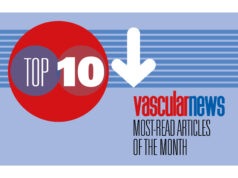
On 2 November, the US Food and Drug Administration (FDA) expanded the approved use of rivaroxaban (Xarelto) to include treating deep vein thrombosis (DVT) or pulmonary embolism (PE), and to reduce the risk of recurrent DVT and PE following initial treatment.
The FDA already approved rivaroxaban in July 2011 to reduce the risk of DVTs and PEs from occurring after knee or hip replacement surgery, and to reduce the risk of stroke in people with non-valvular atrial fibrillation in November 2011.
The FDA reviewed rivaroxaban’s new indication under the agency’s priority review programme, which provides an expedited six-month review for drugs that offer major advances in treatment or that provide treatment when no adequate therapy exists.
“Xarelto is the first oral anti-clotting drug approved to treat and reduce the recurrence of blood clots since the approval of warfarin nearly 60 years ago,” said Richard Pazdur, director of the Office of Hematology and Oncology Products in the FDA’s Center for Drug Evaluation and Research.
Other drugs approved by FDA to treat or reduce the risk of blood clots include Lovenox (enoxaparin), generic versions of enoxaparin, Arixtra (fondaparinux), Fragmin (dalteparin), Coumadin (warfarin), and heparin.
The safety and effectiveness of rivaroxaban for the new indications were evaluated in three clinical studies. A total of 9,478 patients with DVT or PE were randomly assigned to receive Xarelto, a combination of enoxaparin and a vitamin K antagonist (VKA), or a placebo. The studies were designed to measure the number of patients who experienced recurrent symptoms of DVT, PE or death after receiving treatment.
Results showed rivaroxaban was as effective as the enoxaparin and VKA combination for treating DVT and PE. About 2.1% of patients treated with rivaroxaban compared with 1.8% to 3% of patients treated with the enoxaparin and VKA combination experienced a recurrent DVT or PE. Additionally, results from a third study showed extended rivaroxaban treatment reduced the risk of recurrent DVT and PE in patients. About 1.3% of patients treated with Xarelto compared with 7.1% of patients receiving placebo experienced a recurrent DVT or PE.
The major side effect observed with rivaroxaban is bleeding, similar to other anti-clotting drugs.













